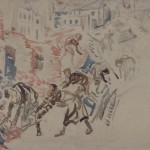Google Books has helped me to find all sorts of references to my family. I have used it to find books with my great-grandfather’s paintings as well as essays and commentaries about his work. I once found a book, Ten jest z ojczyzny mojej (He is of/from my Fatherland), with information at the back of the book citing data obtained from another source. The original source was, I believe, some sort of questionnaire on assistance to the Jews of Warsaw. What I found on page 1029 of this book, just one sentence, really, was this:
Jozef Kulig: na prosbe przelotnego znajomego Henryka Brokmana-Wolskiego, spotkanego na ulicy, wyprowadzil kolejno w przeddzien likwidacji “malego getta” z getta warszawskiego 3 kobiety i 2 dzieci (m. in Jurka Ryneckiego-Traske i jego matke) z rodziny Brokmana i umiescil ich w Podkowie Lesnej (“Zycie Warszawy” 1968, 31 III- 1 IV).
The translation is rough, but is as follows:
Joseph Kulig: at the request of a casual friend of Henry Brokmana-Wolski, you meet on the street, moved out sequentially on the eve of the liquidation of “small ghetto” of the Warsaw Ghetto, 3 women and 2 children (including Jurek Ryneckiego-Trask and his mother) Brokmana family and placed them in Podkowa Lesna (“Warsaw life” 1968, 31 III-1 IV).
This statement was an incredibly powerful thing for me to find. You have to understand, my family really never spoke about the war years. I don’t know where they hid, where they got false papers, or how they managed day to day. While this sentence doesn’t seem to say much, it actually tells me a lot. This was definitely our family. Henry was my grandmother’s brother. “Trask” was really “Trzask” pronounced “chusk”. Trzaska is Trask in a different grammatic case, just as Ryneckiego is the same as Rynecki. Trask was the fake name my grandfather George used during the war. The three women were my grandmother Stella, her sister-in-law Franka, and my great-grandmother, Cecylia. The 2 children were my father and his cousin, Franka’s daughter, Helen.
It’s amazing what you can find if you keep searching.
